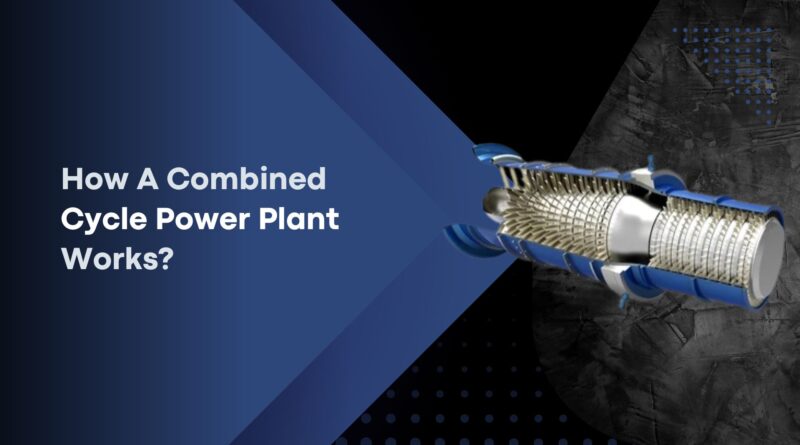How a Combined Cycle Power Plant Works?
Combined cycle gas plants are a type of natural gas power plant that produces electricity by combining a simple cycle gas plant with a second steam engine that uses the Rankine cycle. To generate steam, the steam engine uses the heat generated by the hot exhaust gases from the initial gas turbine. This steam can then expand through another turbine, generating even more electricity and increasing the plant’s overall efficiency. These plants can achieve 55% efficiency, but their dispatch times are longer than those of simple cycle natural gas plants. The combined cycle is usually more expensive. A simple cycle plant costs around US$389/kW, while combined cycle plants cost between US$500 and 550/kW, according to the EIA.
Operation
The first part of the plant employs a gas turbine, which can be found on its own page here. It works by compressing air, injecting fuel, and igniting the mixture, which expands and spins the turbine. This turbine is connected to a generator that produces electricity. This process produces hot exhaust gases, which are typically emitted by a simple cycle plant (releasing waste heat).
Efficiency
Combining the gas and steam cycles allows for high input temperatures and low output temperatures. The efficiency of the cycles is increased because they use the same fuel source. In order to set up its thermodynamic cycle, a combined-cycle plant operates between the high temperature of the gas turbine and the waste heat temperature from the steam cycle condensers. The cycle has a high Carnot efficiency due to its wide temperature range. Although the actual efficiency is lower than that of the Carnot plant, it is still greater than either plant alone.
A combined cycle power station’s electric efficiency can exceed 60% when operating new or unaged and at a constant output (ideal conditions). Combined cycle thermal units, like single cycle thermal units, can provide low-temperature heat to industrial processes, district heating systems, and other applications. This is referred to as cogeneration, and power plants of this type are frequently referred to as combined heat and power (CHP) plants.
Methods for Improving Efficiency
When the combustion temperature rises, the working fluid expands more, increasing turbine efficiency. As a result, turbine efficiency is limited by the first stage of blades’ ability to withstand higher temperatures.
Research into materials and cooling is ongoing. Pressurizing hot-stage turbine blades with coolant is a common technique adapted from aircraft.
Additionally, proprietary methods are used to improve the aerodynamic efficiency of turbine blades. Various vendors have tested various coolants. The most common medium is air, but steam is also becoming more popular. Some engine manufacturers’ hot sections may now have single-crystal turbine blades, a technique already used in military aircraft engines.
Pre-cooling combustion air can also improve CCGT and GT efficiency. It not only increases its density, but it also increases its expansion ratio. This technique is commonly used to increase power output in hot climates. To accomplish this, either a moist matrix or ice storage air conditioning is used in the turbine’s inlet. Because the temperature is lower in this method, the improvement is greater.
Because fuels, gasification, and combustion all play a role in fuel efficiency, combustion technology is a very active research area. Computer simulations typically combine aerodynamics and chemistry to find combustor designs that maximize fuel burn-up while minimizing pollution and dilution of exhaust gases. To prevent the formation of nitrates and ozone, some combustors inject other materials, such as steam or air, to reduce pollution.
In addition, research on Rankine cycle steam generators is being conducted. The majority of plants already employ two-stage steam turbines that reheat steam between stages. Heat exchanger efficiency can be increased by increasing thermal conductivity. It is possible, for example, to make nuclear reactor tubes thinner (for example, by using stronger or corrosion-resistant steel). Silicon carbide sandwiches, which do not corrode, can also be used.
Modified Rankine cycles are also being developed. Two promising technologies are ammonia/water mixtures and supercritical carbon dioxide turbines.
Configuration with Multiple Shafts
For a multi-shaft system, up to three gas turbines are typically connected to a single steam system. By using a single large steam turbine and heat sink, operation and maintenance costs can be reduced. A larger steam turbine can operate at higher pressures, resulting in a more efficient steam cycle. A multi-shaft system has a slightly higher initial cost.
The size of the plant and the number of required gas turbines may also influence which type is the most cost-effective. Having more pieces of equipment can increase the cost of operating and maintaining a collection of single-shaft combined cycle power plants. However, the company can save money on interest by increasing plant capacity as needed.
Conclusion
Combined Cycle Power Plant (CCPP) optimizes electricity generation by integrating gas and steam turbines. The process begins with burning natural gas in a gas turbine, which generates electricity and produces hot exhaust gases. These gases are then used to produce steam in a heat recovery steam generator, which powers a steam turbine for additional electricity production. This method significantly enhances efficiency and reduces emissions compared to traditional power plants. CCPPs exemplify innovative engineering, offering a sustainable and efficient solution to meet rising energy demands while addressing environmental concerns.
Global suppliers, such as WOC, offer GE Speedtronic components for your Speedtronic system. These companies provide OEM Speedtronic and GE Excitation replacement parts, including models like IS200ESYSH2A, and IS200TBCIH2BBC.
Also read – How to Delete Duplicate Mail in Outlook?

